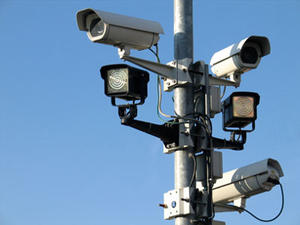SurveillancePrivacy, cost concerns check drive for more surveillance cameras
Law enforcement agencies in cities across the United States are campaigning to increase surveillance on city streets, impressed with the effectiveness of video surveillance in helping the Boston Police identify the two suspects in the Boston Marathon bombings. This campaign to expand law enforcement’s surveillance power is likely to run into stiff opposition, as Americans have proven suspicious of allowing the government powers which would infringe on privacy. Expanding surveillance networks also costs money, and these are tight budgetary times.

Privacy concerns and cost bog down surveillance camera expansion // Source: nabeeya.net
Law enforcement agencies in cities across the United States are campaigning to increase surveillance on city streets, impressed with the effectiveness of video surveillance in helping the Boston Police identify the two suspects in the Boston Marathon bombings.
The Miami Herald reports that lawmakers are considering changes in regulations which would allow police access to cameras used to monitor traffic. This campaign to expand law enforcement’s surveillance power is likely to run into stiff opposition, as Americans have proven suspicious of allowing the government powers which would infringe on privacy. Expanding surveillance networks also costs money, and these are tight budgetary times.
“Look, we don’t want an occupied state. We want to be able to walk the good balance between freedom and security,” Los Angeles Police Deputy Chief Michael Downing, who heads the Department’s Counter-Terrorism and Special Operations Bureau, told the Herald.
“If this helps prevent, deter, but also detect and create clues to who did (a crime), I guess the question is can the American public tolerate that type of security,” Downing said.
Experts note that whether Americans like it or not, urban surveillance will likely increase in the next few years.
“One of the lessons coming out of Boston is it’s not just going to be cameras operated by the city, but it’s going to be cameras that are in businesses, cameras that citizens use,” Chuck Wexler, the executive director of the Police Executive Research Forum, told the Herald. “You’ll see the use of cameras will skyrocket.”
Law enforcement agencies have recently been pushing for greater integration of surveillance systems. An integrated network would make it easier for law enforcement to cameras business use for their own purposes, instead of asking business owners for the recordings.
Charles Ramsey, the police commissioner for Philadelphia, invited business owners with cameras in public spaces to register them with the police department. In Chicago Mayor Rahm Emanuel is working to expand the city’s network of 22,000 cameras, and officials in the city of Houston want to add to their network of 450 cameras through public and private partnerships. The city currently has cameras that watch over the water and rail systems, freeways, and public spaces.
“If they have a camera that films an area we’re interested in, then why put up a separate camera?” Dennis Storemski, director of Houston mayor’s Office of Public Safety and Homeland Security told the Herald. “And we allow them to use ours too.
The Herald notes that the United States lags behind other countries when it comes to public surveillance, mostly because there are more than 18,000 local law enforcement departments, each with its own policies. Then there are the problems mentioned before: cost ( a high definition camera can cost around $2,500, before installation and maintenance costs are taken into account); and privacy concerns (in several states judges ordered the removal of speeding cameras or cameras monitoring intersections for red-light violations).
